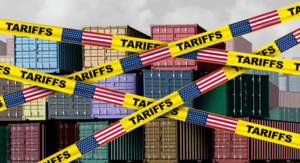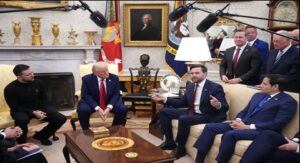
The Role of BRICS in De-dollarization: Promoting Economic Development & Balance
The role of BRICS in de-dollarization emerges as a significant force shaping the global economic aspect. As a coalition of five major emerging economies—Brazil, Russia, India, China, and South Africa—BRICS wields significant influence in fostering economic development and balance.
With a collective aim to reduce dependency on the US dollar, BRICS nations are spearheading initiatives to promote alternative currencies and financial mechanisms.
This strategic endeavor not only aims to mitigate risks associated with dollar dominance but also fosters greater autonomy and stability within the member states’ economies, ultimately advancing global economic prosperity.
Table of Contents
Role of BRICS in De-dollarization
In the prospect of global economics, the BRICS nations—Brazil, Russia, India, China, and South Africa—have emerged as key players, representing a significant portion of the world’s population, landmass, and economic output.
One crucial initiative that BRICS has been actively pursuing is de-dollarization, aiming to reduce reliance on the US dollar in international trade and finance.
It moves towards diversification, coupled with the role of BRICS in de-dollarization, holds the promise of fostering economic development and restoring balance in the global financial system.
Here, we delve into the significance of BRICS’ efforts in de-dollarization in 7 key points.
1. Reducing Dependency on the US Dollar
The overwhelming prevalence of the US dollar in global transactions presents significant vulnerabilities for economies reliant on it. BRICS nations acknowledge this risk and prioritize diversification to safeguard against potential disruptions.
The role of BRICS in de-dollarization is crucial in this regard. As per the International Monetary Fund (IMF), the US dollar comprised approximately 61% of global foreign exchange reserves by the third quarter of 2023, emphasizing the critical need for alternative mechanisms.
Diversification strategies become imperative to reduce dependency on a single currency, ensuring resilience in the face of economic uncertainties and fluctuations in the global financial situation. Addressing this issue is crucial for bolstering stability and fostering sustainable growth across diverse economies.
2. Strengthening Regional and Bilateral Trade
Efforts to de-dollarize within the BRICS (Brazil, Russia, India, China, South Africa) aim to promote regional and bilateral trade using national currencies or alternative units like the Chinese yuan or Russian ruble.
The shifting strengthens economic ties within the bloc, reducing vulnerability to currency fluctuations and external shocks. The role of BRICS in de-dollarization has been instrumental in advancing this agenda, with member countries actively working together to diversify their currency reserves and promote the use of local currencies in trade.
Notably, the China-Russia trade relationship has flourished, with bilateral trade reaching $146.9 billion in 2022, underscoring the effectiveness of using local currencies.
By reducing reliance on the dollar and embracing alternative currencies, BRICS members enhance their economic sovereignty and decrease dependency on external financial systems, thereby fostering greater stability and autonomy in their trade relations.
3. Creating Financial Infrastructure
The BRICS nations, consisting of Brazil, Russia, India, China, and South Africa, have been actively working to develop financial infrastructure aimed at reducing reliance on the US dollar.
Initiatives such as the BRICS New Development Bank (NDB) and the Contingent Reserve Arrangement (CRA) have been established to provide alternative avenues for financing development projects and protecting against financial instability.
These efforts seek to lessen dependence on traditional Western-dominated institutions like the World Bank and the International Monetary Fund. By fostering greater financial autonomy and cooperation among member countries, BRICS aims to bolster economic resilience and promote sustainable development on a global scale.
The role of BRICS in de-dollarization is integral to these efforts, as it aims to reduce the dominance of the US dollar in international trade and finance, thereby enhancing the economic sovereignty of member nations and contributing to a more balanced global financial system.
4. Enhancing Monetary Sovereignty
De-dollarization is a strategic move by BRICS nations to assert greater control over their monetary policies and reduce dependency on the US dollar-dominated financial system.
By diversifying their currency reserves and conducting transactions in alternative currencies, such as the Chinese yuan or the Russian ruble, these countries aim to enhance their monetary sovereignty and insulate themselves from external pressures, including sanctions and fluctuations in the value of the dollar.
Shifting towards autonomy promotes economic stability and resilience, enabling BRICS nations to navigate global economic uncertainties with greater confidence and flexibility.
Ultimately, de-dollarization aligns with their broader goal of asserting their influence on the global stage and promoting multipolarity in the international financial system.
The role of BRICS in de-dollarization is significant as it represents a collective effort by these emerging economies to challenge the dominance of the US dollar and establish a more balanced global financial architecture.
5. Promoting Multipolarism in Global Finance
BRICS’ de-dollarization efforts aim to diversify global finance, reducing dependency on the US dollar. This move fosters a more balanced international financial syatem, challenging Western dominance. The role of BRICS in de-dollarization is crucial as these nations – Brazil, Russia, India, China, and South Africa – advocate for a fairer economic system, inclusive of diverse voices.
By asserting their influence, they push for reforms reflecting the needs of emerging economies. This shift marks a step towards multipolarity, where power is distributed more evenly among nations. Ultimately, BRICS’ actions pave the way for a more equitable global economic order, promoting cooperation and mutual benefit among participating countries.
6. Addressing Economic Inequality
De-dollarization within BRICS aligns with efforts to address economic inequality on a global scale. By diversifying currency reserves and promoting alternative payment systems, BRICS nations aim to create a more balanced distribution of economic power and resources.
This can potentially uplift economies that have historically been marginalized within the prevailing dollar-dominated financial architecture.
The role of BRICS in de-dollarization is crucial as it seeks to reduce their dependence on the US dollar, which could decrease the influence of Western financial institutions and provide more autonomy in global trade and finance for emerging economies.
7. Supporting Sustainable Development Goals
The de-dollarization agenda of BRICS is intricately linked with the pursuit of sustainable development goals (SDGs). By fostering economic stability, enhancing monetary sovereignty, and promoting regional cooperation, BRICS nations contribute to advancing SDGs such as poverty eradication, infrastructure development, and sustainable economic growth.
This underscores the role of de-dollarization as a catalyst for positive socioeconomic change on a global scale. By reducing dependence on the US dollar, BRICS countries aim to create a more balanced international monetary system that better serves the interests of developing nations, while also promoting resilience and stability in the face of economic challenges.
The role of BRICS in de-dollarization is crucial in reshaping the global financial scenery and ensuring greater autonomy for emerging economies.
Bottom Line
The role of BRICS in de-dollarization goes beyond mere economic diversification. It signifies a collective endeavor to reshape the global financial system, fostering economic development, stability, and balance.
Through regional cooperation, financial innovation, and a commitment to multipolarism, BRICS nations are spearheading efforts to create a more equitable and resilient global economy. By reducing reliance on the US dollar and promoting alternative currencies and payment systems, BRICS aims to increase sovereignty and reduce vulnerability to external shocks.
This strategic approach not only enhances the economic prospects of member nations but also contributes to rebalancing global power dynamics.





